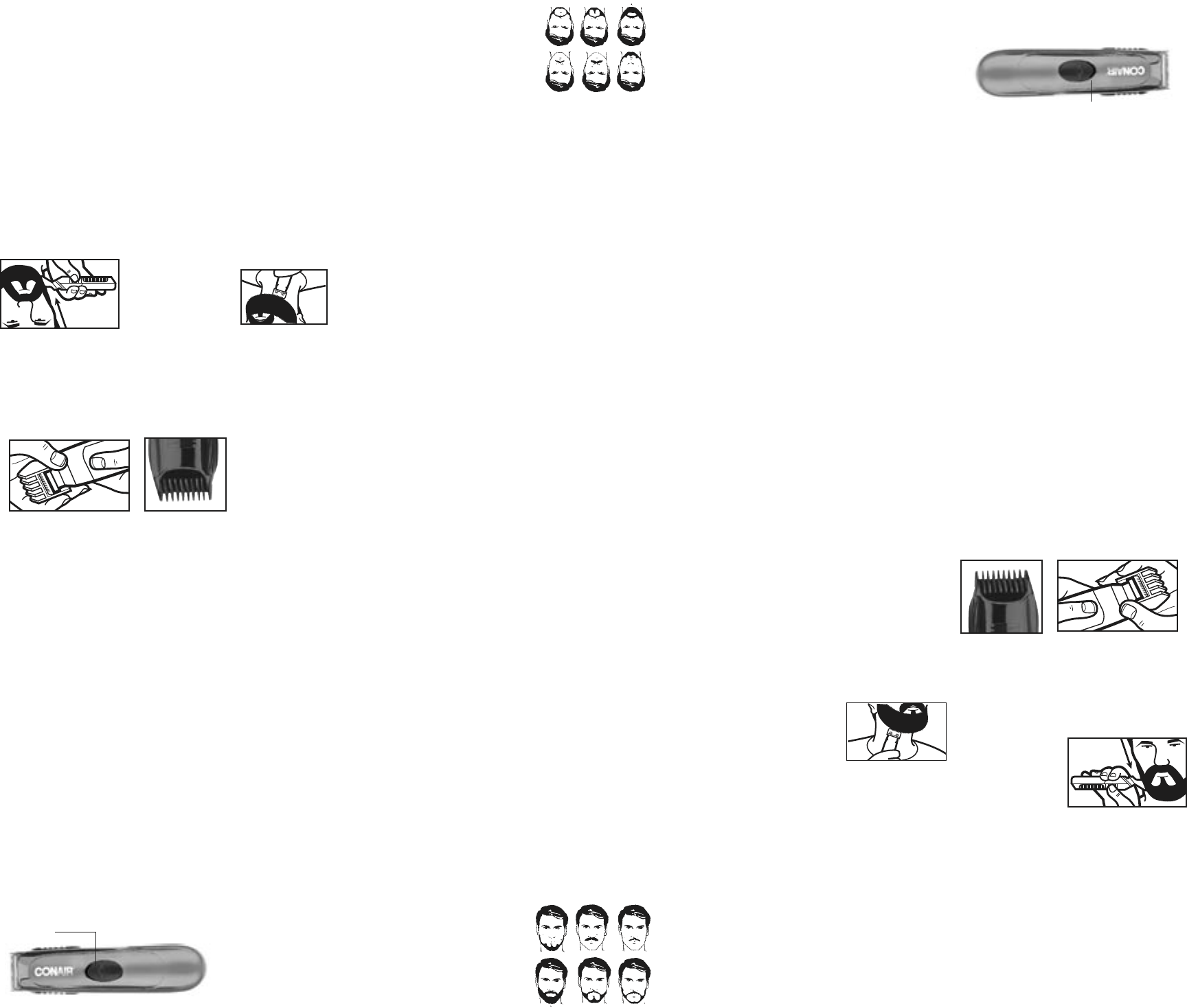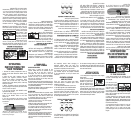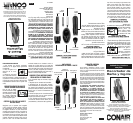
TAKING CARE
OF YOUR TRIMMER
OILING THE BLADES
About once a month you should oil the
trimmer blades with the oil provided in your
kit. It is best to do this over a piece of
newspaper. Turn the trimmer on and hold
it so that the blades are pointed downward.
Spread one drop of oil across the blades,
then turn the trimmer off and wipe away the
excess oil with a soft cloth.
Be careful not to use too much oil and don’t oil your
trimmer more than necessary, as this could damage
the motor. (Never attempt to oil the motor bearing as
it is permanently lubricated.)
After oiling the blades, replace the trimmer and oil
packet in the trimmer storage stand.
BLADE CARE
Because the trimmer blades are precision made
for a very special use, they should always be
handled with care. This trimmer comes with
a removable blade set for easy cleaning. To
remove the blades follow these steps:
1.Make sure the trimmer is off, and the bat-
teries have been removed.
2.With the power switch facing you, gently push
up under the blades until they pop off.
3.To replace, align the tabs on the bottom of
the blades inside the mounting area on the
back of the trimmer and push down until the
blades snap into place.
Each time you finish using the trimmer, take the
cleaning brush provided and brush away any
loose hair that has collected in the blades. Then
store the trimmer in its storage stand until the
next use.
Be especially careful when changing or
adjusting blades. When you have your
trimmer serviced, be sure that all blades are
sharpened or replaced at the same time.
To promote the long life of the appliance, use
your trimmer only for the purpose intended
by the manufacturer- to trim your beard and
mustache.
GROWING A BEARD
AND MUSTACHE
There are three key factors that deter-
mine which beard or mustache style is most
suitable for your face:
1. The shape and dimensions of your face.
2. The natural growth of your beard/mustache.
3. The thickness of your beard/mustache.
If you are unsure of the type of beard or mus-
tache that most suits your face, speak with a
professional hair stylist and ask for an opinion
on what style would be best.
TYPES OF BEARDS/MUSTACHES
Once your beard or mustache has been styled,
it is essential that you maintain its appearance.
To do this, use your shaper to trim your beard/
mustache weekly.
For the best trimming results, your beard should
be slightly damp (not wet) before using the trim-
mer. This will prevent the trimmer from removing
more hair than desired.
GETTING STARTED
OUTLINING YOUR BEARD
1. It is always best to begin with a clean, slightly
damp beard.
2. After you have combed
through your beard in the
direction it grows natu-
rally, you will want to out-
line the desired shape,
beginning under your jawline.
3. Begin defining your beard’s shape under your
chin and work upward on each side of your face
toward your ears. Then define the upper outline
of your beard across your cheeks, past your side-
burns and toward your hairline.
NOW YOU’RE READY
TO TRIM YOUR BEARD
1. Your trimmer adjusts to five positions so you
can have a beard length from 1/8” (shortest) to
5/8” (longest).
2. To use the 5-posi-
tion comb, slide it over
the trimmer blades
and snap down into
position. At first, until
you become familiar
with the adjustments, use the longest trim setting
(5/8”). (You can always go back and make your
beard a little shorter.)
3. Begin trimming your beard using smooth,
even strokes. Start with your sideburns and work
downward toward your chin. (Never attempt to trim
against the natural growth of your beard, because the
hair will be cut too short.)
4. If you decide you want a closer trim, you can
now adjust the 5-position comb to a shorter
setting (such as 1/2” or 3/8”) and go over
your beard again until you achieve the desired
length.
OPERATING
INSTRUCTIONS FOR
YOUR TRIMMER
1. Remove the battery compartment cover by
pushing in and down toward the bottom of the
trimmer.
2. Align the two “AA”* batteries with the
positive and negative positions indicat-
ed inside the battery compartment. Being
careful not to bend the clips, insert the
negative end of each battery first so it will slip
easily into position.
3. Return the battery cover to its original posi-
tion by pushing it in and up until you hear a small
click as it locks into place.
4. To use your trimmer, push ON/OFF switch
upwards to ON position.
5. After you finish using your trimmer, push
down on the ON/OFF switch to turn the
trimmer off.
6. For your convenience, the trimmer comes
with a storage base to hold the trimmer and
accessories.
*Requires 2 AA batteries (not included). We rec-
ommend using alkaline batteries in your trimmer
because they last longer.
On/Off Switch
CUIDADO DE SU
RECORTADOR
LUBRICACIÓN DE LAS HOJAS
Aproximadamente una vez por mes debe lubricar
las hojas del recortador con el aceite provisto en
su equipo. Lo mejor es hacerlo sobre una hoja
de periódico. Encienda el recortador y sosténgalo
de manera que las hojas apunten hacia abajo.
Distribuya una gota de aceite a lo largo de las
mismas, luego apague el recortador y quite el
exceso de aceite con un paño suave.
Tenga cuidado de no usar demasiado aceite y no
lubrique su recortador más de lo necesario, ya
que puede dañar el motor. (Nunca intente lubri-
car el cojinete del motor, ya que éste se lubrica
permanentemente).
Luego de lubricar las hojas, vuelva a colocar el
recortador y el envase de aceite en el soporte.
CUIDADO DE LAS HOJAS.
Dado que las hojas son instrumentos de pre-
cisión fabricados para un uso muy específico,
deberán tratarse siempre con cuidado. Este
recortador se entrega con un conjunto remov-
ible de hojas para facilitar su limpieza. Para
retirar las hojas, siga los pasos descritos a
continuación:
1. Asegúrese que el recortador está apagado y
que se han quitado las pilas.
2. Con el interruptor de encendido mirando
hacia usted, empuje las hojas suavemente
hacia arriba hasta que éstas se desprendan.
3. Para volver a colocarlas, alinee las lengüe-
tas de la parte inferior de las hojas dentro
del área de montaje en la parte trasera del
recortador y empuje hacia abajo hasta que
traben en su posición.
Cada vez que termine de usar el recortador,
tome el cepillo de limpieza provisto y quite
cualquier pelo suelto que se haya acumulado
en las hojas. A continuación, guarde el
recortador en su soporte hasta que vuelva a
utilizarlo.
Tenga especial cuidado cuando cambie o ajuste
hojas. Cuando envíe su recortador, a reparar,
asegúrese que todas las hojas se afilen o reem-
placen al mismo tiempo.
Para prolongar la vida útil del aparato, use su
recortador únicamente para el propósito para el
que fue fabricado – el de recortar su barba y su
bigote.
LA BARBA Y EL BIGOTE APROPIADOS
Existen tres factores clave que determinan qué
estilo de barba y bigote es el más apropiado
para su rostro:
1. La forma y dimensiones de su rostro.
2. El crecimiento natural de su barba o bigote.
3. La espesura de su barba o bigote.
Si no está seguro respecto a qué tipo de barba
o bigote es el más adecuado para su cara, hable
con un peluquero y pídale su opinión sobre el
estilo que más le conviene.
TIPOS DE BARBAS Y BIGOTES
Una vez que le ha dado forma a su barba o
bigote, es esencial que mantenga su aspecto.
Para ello, use su modelador para recortarla/o
semanalmente.
Para obtener los mejores resultados, debe
humedecer (no mojar) ligeramente su barba.
Esto evitará que el recortador quite más pelo
que el deseado.
PRIMEROS PASOS
DELINEACIÓN DE SU BARBA
1. Siempre es mejor comenzar con la barba
limpia y ligeramente humedecida.
2. Una vez que la ha pei-
nado en la dirección de su
crecimiento natural, querrá
delinear la forma deseada,
comenzando bajo la línea
de la mandíbula.
3. Comience definiendo la forma de su barba
bajo la barbilla y trabaje hacia arriba a ambos
lados de la cara en dirección hacia sus orejas.
Luego defina el contorno superior a lo largo de
sus mejillas, más allá de sus patillas y hacia el
nacimiento del cabello.
AHORA ESTÁ LISTO PARA
RECORTAR SU BARBA
1. Su recortador se ajusta en cinco posiciones,
por lo que puede obtener longitudes de barba
entre 3 mm (1/8") (la más corta) y 16 mm
(5/8") (la más larga).
2. Para usar el peine
guía de 5 posiciones,
deslícelo sobre las
hojas de su recorta-
dor y trábelo hacia
abajo en su posición.
Al principio, y hasta que se familiarice con los
ajustes, use la posición de recorte más larga
(16 mm ó 5/8"). (Siempre tiene la posibilidad
de acortar su barba).
3. Comience a recortar su barba mediante
pasadas suaves y parejas. Empiece por las
patillas y siga hacia abajo en dirección hacia
la barbilla. (Nunca intente recortar en sentido
contrario a la dirección natural de crecimiento,
dado que cortará el pelo demasiado corto).
4. Si decide que quiere la barba más corta,
ahora puede ajustar el peine guía de 5 posi-
ciones a una opción más corta (12 mm ó ½"
o bien 9 mm ó 3/8") y pasarlo nuevamente
hasta alcanzar el largo deseado.
INSTRUCCIONES
DE MANEJO DE SU
RECORTADOR
1. Quite la tapa del compartimiento de pilas
presionando hacia adentro y abajo de la parte
inferior de su recortador.
2. Alinee las dos pilas AA* con las posiciones
positiva y negativa indicadas dentro del com-
partimiento de pilas. Cuidando de no doblar
los clips, inserte en primer lugar el extremo
negativo de cada pila para que éstas se desli-
cen fácilmente a su posición.
3. Vuelva a colocar la tapa del compartimiento
en su posición original presionándola hacia
adentro y arriba hasta escuchar un clic que
indica que se ha trabado en su posición.
4. Para usar su recortador, deslice el inter-
ruptor ENCENDIDO/APAGADO hacia arriba a la
posición ENCENDIDO.
5. Luego de usarlo, apague el recortador desli-
zando el interruptor ENCENDIDO/APAGADO
hacia abajo a la posición APAGADO.
6. Para guardarlo más cómodamente, el
recortador viene con un soporte que sostiene
el aparato y los accesorios.
* Requiere 2 pilas AA (no incluidas). Recomendamos
usar pilas alcalinas en su recortador, porque son de
mayor duración.
Interruptor ENCENDIDO/APAGADO




